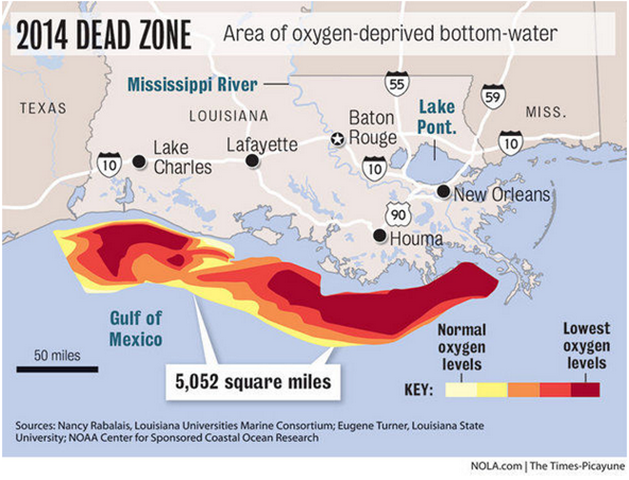Floodwaters causing new Gulf of Mexico dead zone off Texas
By Rusty Surette
18 June 2015 COLLEGE STATION (KBTX) – Record rainfall totals in many parts of Texas the past few weeks means a record amount of freshwater pouring into the Gulf of Mexico – as high as 10 times the normal rate – and that could lead to huge problems for marine life and commercial fishermen very soon, warns a Texas A&M University oceanographer. Steve DiMarco, professor of oceanography, says the huge rainfall amounts in the last month mean that such rivers as the Brazos, Trinity, Colorado, and others currently are carrying record amounts of water flowing southward to the Gulf, similar to a situation that occurred in 2007 when rivers carried 10 to 20 times the normal seasonal rate of discharge into the Gulf. “When this happens, the coastal waters become stratified, meaning that the lighter freshwater will stay at the surface and cap the saltier, and heavier, ocean water beneath,” he explains. “Because the salt water is isolated from the atmosphere, oxygen levels in that water will begin to drop. “That is exactly what is going on right now and in the weeks to come, and when this happens, it almost always means many marine organisms, particularly those that live near and at the ocean bottom, can’t get enough oxygen and they can get sick and die.” In a “dead zone,” technically called hypoxia, marine life for thousands of square miles become distressed and fish kills can occur. Dead zones have been happening in the Gulf for decades off the Texas-Louisiana coastline, but the record amounts of rain this year could mean a sort of dead zone within a dead zone, DiMarco says. Such low levels of oxygen are believed to be caused by nutrient pollution from farm fertilizers and other land-based sources as they empty into rivers such as the Mississippi and eventually make their way into the Gulf. DiMarco has made 28 research trips to investigate the dead zone since 2003. He says the size of the dead zone off coastal Louisiana has been routinely monitored since 1985. Previous research has also shown that nitrogen levels in the Gulf related to human activities have tripled over the past 50 years. “Because it has the possibility to extend much further west than in typical years, the dead zone could be more intense and even much larger this year,” DiMarco believes. “This is very similar to what happened in 2007, when dead zone conditions existed from June to September and the only thing that ended it was a hurricane, Humberto, that provided strong enough winds to mix the freshwater and saltwater and allowed oxygen back into the lower water. “This year’s flood levels are at least as high as they were back in 2007, and all of that water in the rivers will eventually make its way down into the Gulf. [more]
A&M Researchers Say Texas Flooding Could Cause Big Problems In Gulf 
By MICHAEL GRACZYK
11 June 2015 HOUSTON (Associated Press) – The heavy rains that caused major flooding along several Texas rivers over the past several weeks are fueling the creation of a new “dead zone” in the Gulf of Mexico and soon could lead to significant problems for marine life and commercial fishing, a Texas A&M University oceanographer said Thursday. “Dead zones” are formed when freshwater empties into the salty waters of the Gulf, causing oxygen levels to drop and depriving marine life of oxygen. “When this happens, the coastal waters become stratified, meaning that the lighter freshwater will stay at the surface and cap the saltier, and heavier, ocean water beneath,” Steve DiMarco, a Texas A&M scientist who’s researched the phenomenon for more than a decade, said. That is exactly what is going on right now and in the weeks to come, and when this happens, it almost always means many marine organisms, particularly those that live near and at the ocean bottom, can’t get enough oxygen and they can get sick and die.” Scientists for years have monitored a dead zone off the coast of Louisiana caused by waters of the Mississippi River and the Atchafalaya River, which branches off from the Mississippi. DiMarco said, similarly, that the Brazos, Trinity, Colorado and other rain-swollen Texas rivers now are carrying record amounts of freshwater south to the Gulf. “There are no reports of fish kill yet,” he said. “We’re still fairly early in the process here.” But he said buoys in the Gulf used for oil spill responses also register salinity “and they’re registering very low right now.” A similar situation in 2007 left dead fish on jetties near Freeport, where the Brazos River enters the Gulf. [more]
Floodwaters causing new Gulf of Mexico dead zone off Texas
